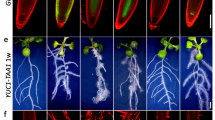Abstract
We modified a video digitizer system to allow short-term high-resolution measurements of root elongation in intact seedlings ofArabidopsis thaliana (L.) Heynh. We used the system to measure the kinetics of promotion and inhibition of root elongation by applied auxin and to determine the dose-response relationship for auxin action on elongation in roots of wild-type seedlings and seedlings of mutants (axr1,aux1, andaxr2) with altered auxin responsiveness. Roots of the mutants showed less inhibition in the presence of inhibitory concentrations of auxin than did roots of the wild type. The latent period preceding the change in elongation rate after auxin application was the same foraxr1 andaxr2 as for the wild type whereas the latent period foraux1 was about twice as long as for the wild type. Low concentrations (ca. 10−11 M) of auxin induced substantial promotion of root elongation in the wild type and inaxr2.
Similar content being viewed by others
References
Baskin, T.I., Betzner, A.S., Hoggart, R., Cork, A., Williamson, R.E. (1992) Root morphology mutants inArabidopsis thaliana. Aust. J. Plant Physiol.19, 427–437
Burström, H. (1957) On the adaptation of roots to β-indolylacetic acid. Physiol. Plant.10, 187–197
Edwards, K.L., Scott, T.K. (1977) Rapid-growth responses of corn root segments: Effect of auxin on elongation. Planta135, 1–5
Estelle, M.A., Somerville, C. (1987) Auxin-resistant mutants ofArabidopsis thaliana with an altered morphology. Mol. Gen. Genet.206, 200–206
Evans, M.L. (1976) A new sensitive root auxanometer. Preliminary studies of the interaction of auxin and acid pH in the regulation of intact root elongation. Plant Physiol.58, 599–601
Foster, R.J., McRae, D.H, Bonner, J. (1952) Auxin-induced growth inhibition a natural consequence of two-point attachment. Proc. Natl. Acad. Sci. USA38, 1014–1022
Gil, P., Liu, Y, Orbović, V., Verkamp, E., Poff, K.L., Green, P.J. (1994) Characterization of the auxin-inducibleSAUR-AC1 gene for use as a molecular tool inArabidopsis. Plant Physiol.104, 777–784
Goodwin, R.H. (1972) Studies on roots. V. Effects of indoleacetic acid on the standard root growth pattern ofPhleum pratense. Bot. Gaz.133, 224–229
Gougler, J.A., Evans, M.L. (1981) Adaptation of corn roots to exogenously applied auxin. Physiol. Plant.51, 394–398
Hejnowicz, Z. (1961) The response of the different parts of the cell elongation zone in root to external β-indolylacetic acid. Acta Soc. Bot. Pol.30, 25–42
Hejnowicz, Z., Erickson, R.O. (1968) Growth inhibition and recovery in roots following temporary treatment with auxin. Physiol. Plant.21, 302–313
Housley, S., Bentley, J.A., Bickle, A.S. (1954) Studies on plant growth hormones. III. Application of enzyme reaction kinetics to cell elongation in theAvena coleoptile. J. Exp. Bot.5, 373–388
Ishikawa, H., Evans, M.L. (1990) Electrotropism of roots. Role of the root cap and relationship to gravitropism. Plant Physiol.94, 913–918
Ishikawa, H., Evans, M.L. (1993) The role of the distal elongation zone in the response of maize roots to auxin and gravity. Plant Physiol.102, 1203–1210
Ishikawa, H., Hasenstein, K.H., Evans, M.L. (1991) Computerbased video digitizer analysis of surface extension in maize roots. Kinetics of growth rate changes during gravitropism. Planta183, 381–390
Klee, H., Estelle, M. (1991) Molecular genetic approaches to plant hormone biology. Annu. Rev. Plant Physiol. Plant Mol. Biol.42, 529–551
Leyser, H.M.O., Lincoln, C.A., Timpte, C., Lammer, D., Turner, J., Estelle, M. (1993) Arabidopsis auxin-resistance gene AXR1 encodes a protein related to ubiquitin-activating enzyme E1. Nature364:161–164
Lincoln, C., Britton, J.H., Estelle, M. (1990) Growth and development of the axrl mutants ofArabidopsis. Plant Cell2, 1071–1080
Maher, E.P., Martindale, S.J.B. (1980) Mutants ofArabidopsis with altered responses to auxins and gravity. Biochem. Genet.18, 1041–1053
McClure, B.A., Hagen, G., Brown, C.S., Gee, M.A., Guilfoyle, T.J. (1989) Transcription, organization, and sequence of an auxin-regulated gene cluster in soybean. Plant Cell1, 229–239
Mulkey, T.J., Kuzmanoff, K.M., Evans, M.L. (1982) Promotion of growth and shift in the auxin dose/response relationship in maize roots treated with the ethylene biosynthesis inhibitors aminoethoxyvinylglycine and cobalt. Plant Sci. Lett.25, 43–48
Murashige, T, Skoog, F. (1962) A revised medium for rapid growth and bioassays with tobacco tissue cultures. Physiol. Plant.15, 473–497
Pickett, F.B., Wilson, A.K., Estelle, M. (1990) The auxl mutation ofArabidopsis confers both auxin and ethylene resistance. Plant Physiol.94, 1462–1466
Pilet, P.E., Saugy, M. (1985) Effect of applied and endogenous indol-3-yl-acetic acid on maize root growth. Planta164, 254–258
Pilet, P.E., Saugy, M. (1987) Effect on root growth of endogenous and applied IAA and ABA. A critical reexamination. Plant Physiol.83, 33–38
Pilet, P.E., Elliott, M.C., Moloney, M.M. (1979) Endogenous and exogenous auxin in the control of root growth. Planta146, 405–408
Svensson, S.B. (1972) A comparative study of the changes in root growth, induced by coumarin, auxin, ethylene, kinetin and gibberellic acid. Physiol. Plant.26, 115–135
Tagliani, L., Nissen, S., Blake, T.K. (1986) Comparison of growth, exogenous auxin sensitivity, and endogenous indole-3-acetic acid content in roots ofHordeum vulgare L. and an agravitropic mutant. Biochem. Gen.24, 839–848
Tanimoto, E., Watanabe, J. (1986) Automated recording of lettuce root elongation as affected by auxin and acid pH in a new rhizometer with minimum contact to roots. Plant Cell Physiol.27, 1475–1487
Thimann, K.V. (1937) On the nature of inhibitions caused by auxin. Am. J. Bot.24, 407–412
Trewavas, A.J. (1992) What remains of the Cholodny-Went theory? Plant Cell Environ.15, 759–794
Wilson, A.K., Pickett, F.B., Turner, J.C., Estelle, M. (1990) A dominant mutation inArabidopsis confers resistance to auxin, ethylene and abscisic acid. Mol. Gen. Genet.222, 377–383
Author information
Authors and Affiliations
Additional information
We thank Linda Young and Roger Hangarter for helping to develop the system for mountingArabidopsis seedlings and Wendy Hankie, Julia Hufford, and Ruperto Villella for doing some of the experiments. We thank Roger Hangarter for valuable discussions of the data. This work was supported by National Science Foundation Grant No. DCB-9105807 and by National Aeronautics and Space Administration Grant No. NAG10-0084
Rights and permissions
About this article
Cite this article
Evans, M.L., Ishikawa, H. & Estelle, M.A. Responses ofArabidopsis roots to auxin studied with high temporal resolution: Comparison of wild type and auxin-response mutants. Planta 194, 215–222 (1994). https://doi.org/10.1007/BF01101680
Received:
Accepted:
Issue Date:
DOI: https://doi.org/10.1007/BF01101680




